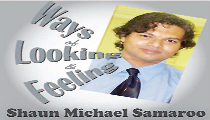We talk so easily of the dichotomy between developed and developing societies, without staring stark reality in the face, without confronting the differences, without active challenging of our abstract acceptance of our condition.
People of a developing society, like ours, face daunting social challenges that folks in the developed world can scarcely understand.
V. S. Naipaul’s idea that the developing society dwells in a state of unawareness of the self, an unconsciousness, a refusal to contemplate the pain and social trauma of daily living, underlines our attitude as a nation.

Our attitude of numbness as a nation forms the root that stifles our development. Yet, in a vicious cycle, our under-development as a society feeds our national attitude, this passive posture of apathy.
We must repeat ad infinitum certain messages until we get it, constantly reasserting certain values until these become ingrained habit that make up our national attitude, our social psyche.
We need to learn so much: how to cultivate a matured, contemporary democracy; how to trust each other; how to engage in matured national conversations. These must become our constant clarion calls, our subject-matter, sounded out every hour throughout our land, with no let-up, until they become national attitudes.
One major difference between a developed society, as scores of Guyanese nationals across the Diaspora know, and an under-developed society, as scores of Guyanese nationals feel at home, is this attitude of posture, poise, stance among the community of nations in the 21st century global village.
The developed world exudes a certain refinement, an uplifted nobleness about its way of being. Despite human flaws in its leaders, the developed world has risen to a good height of excellence, of humane decency, of refined social behaviour in its public spaces, of nobleness and dignified poise.
In the public spaces of our own under-developed society, we see our public spaces filled with social behaviour that is crass, undignified, unrefined and stooped in a degrading of our human dignity.
We would excuse this way of being as a nation if it were only among the common masses. But, alas, we see such a way of being even among our political, cultural and institutional leaders.
The ordinary young citizen looks in vain for role models of excellence of character, originality of thought and nobleness of stature, within the social fabric of our nation.
In our Justice system, at the University of Guyana, among our Parliamentarians, we see a sort of unawareness for noble, dignified humane ways of being.
We see no less than the Presidential figure gyrating on the election platform to lewd lyrics, we hear the street cussing that refuses to regard even the innocence of children, we feel the degradation of deranged citizens decorate the sidewalk of Parliament, we smell the stench of garbage piles across the City, we taste the rank air on our breaths of floods that spread the filth of Georgetown’s underground sewer system into people’s bottom house.
Our basic human dignity we sacrifice as we bicker and fight, accusing and scapegoating each other about our fall as a society.
We lack a national attitude of being men and women of noble hearts, lofty visions, dignified humanity, and excellence of public behaviour.
In village after village, our children walk the streets to and from school to hear loud cussing in the markets and in rum shops, and even in their homes, with scant regard for this idea of building a noble society.
Out of the commonness of undignified toilers of the brutal land under broiling sun for massas who lorded it over us, we became a nation, forged under the brutal oppression of slavery and indentured labour and forced inhumanity.
Yet, in the Founders and moulders of our destiny, in souls like Dr Cheddi Jagan, who married an American Jewish woman and did not allow his Indian estate roots to smash his self-dignity, in Forbes Burnham, who studied in England and rose from the roots of his barefoot ancestors who worked the sugar estate in Barbados as slaves, to ride on horseback as the massas had done, in Dr Walter Rodney, whose celebrated book ‘How Europe Underdeveloped Africa’ confronted the European empires that conquered his ancestors, we see what’s possible for the Guyanese person.
These leaders, despite their human flaws, rose to become dignified, refined, noble citizens of the world in their time. They rose to place our nation as a dignified new society among the commonwealth of nations.
Today, we’re losing that possibility.
Odeen Ishmael, an outstanding diplomat, manages a website at guyana.org that chronicles a lot about our history, our way of being, our growth as a people. On that site, there’s a story of British Guiana in the 1800’s and 1900’s, so full of promise and possibilities, when migrants from all over the West Indian islands migrated here to find their future.
The Burnham family was one that migrated to British Guiana from Barbados, where Forbes Burnham’s father was descended from slaves on a Barbadian plantation.
By the ‘60’s we had developed these sons of our soils, who showed us how to be a noble, refined, world class people. They made mistakes, as frail humans are prone to do.
Nowhere on earth do we see utopia. But there is a major difference between a developed and a developing society. And we need to face those differences, square on, to feel and know our national psyche, our national attitude.
We do not have go in search of lost time, because our history shows us that we can be a noble, refined, world class society. We did it before, before plunging to where we are today, with unnecessary floods shutting down schools across the coast this week, with 16,000 school-leavers failing English in the last two years.
We’re under-developed because of our national attitude.





